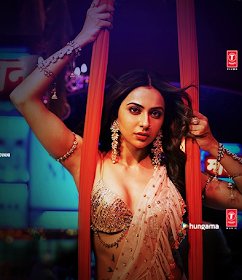|
Release
date:
|
November 15, 2019
|
|
Director:
|
Milap Milan Zaveri
|
|
Cast:
Language:
|
Sidharth
Malhotra, Riteish Deshmukh, Nassar, Rakul Preet Singh, Tara Sutaria, Ravi Kishan, Shaad
Randhawa, Suhasini Mulay
Hindi
|
“Main maaroonga toh mar jayega tu, dobaara
janam lene se darr jayega tu.” This line that the hero fires at the villain
in Marjaavaan comes from an arsenal of rhyming bombast that he uses from the
opening minutes of this exhausting film. Thankfully, there is an arsenal of
adjectives in the English language to match his weaponry. Dated, loud, cliché-ridden, preachy, unimaginative, boring, flat – that
is what Marjaavaan is.
Take
the slotting of the characters for one. Each comes from a checklist that
Bollywood in earlier decades felt compelled to cover exhaustively in most
scripts. Virtuous hero, virtuous woman who exists solely for
him to fall in love with her and thus give her the requisite qualification for
the post of heroine, villain without a single redeeming quality, the other woman in
the ‘golden-hearted tawaif’ mould whose unrequited love for the leading man
survives every trauma thrown her way – you will find them all in Marjaavaan.
As if these Neanderthal formulae are not enough, there are
more. The bad guy is a dwarf in a film that clearly sees a disability as
nothing but a source of drama. The hero is a “lawaaris”. A glamorous woman pops up to do that thingie called an ‘item
song’ with dance moves that include spreading her legs wide, thrusting her
bottom out and wiggling it, and going down on all fours to lift her bottom
again and wiggle it – gosh, there is no originality even in the objectification
of women in Marjaavaan.
And while it is a relief to get a break from the Islamophobia
that has been a regular feature of Hindi cinema in the last couple of years,
there is no joy in returning, as Marjaavaan
does, to an era when the co-existence of religious and linguistic communities
was not treated as a fact of life but as a cause for sugary sentimentality and
in-your-face messaging on secularism.
Oh, and while the nice guy speaks in
verse, the bad guy reels off “what is the height of (optimism, etc)?” kind of
jokes and the female protagonist speaks in riddles.
Considering
all this, it is appropriate that Marjaavaan’s
soundtrack is dominated by remixes.
Sidharth Malhotra plays Raghu, the handsome orphaned foster
child of the gangster played by Nassar. The latter’s son Vishnu (Riteish
Deshmukh) has always resented his father’s love for Raghu, that resentment made
worse by his crushing complex about his congenital short stature. Their
life-long enmity is heightened when Raghu falls in love with the mute Zoya (Tara Sutaria) who
tries to reform the children of the neighbourhood by steering them towards
music and away from an otherwise inevitable life of crime. Rakul Preet Singh stars as Aarzoo, the bar dancer who is devoted to Raghu.
Marjaavaan is written and directed by Milap Zaveri whose
career has so far been built primarily on writing comedies, some of them
largely harmless fun (such as the Varun Dhawan-starrer Main Tera Hero), many of them crude (case in point: Masti, Grand Masti). For this film, Zaveri
ditches high-decibel sexist humour in favour of high-decibel sermonising.
Perhaps in a bid to sound intelligent and relevant, at one point in Marjaavaan he has the hero yelling “mandir banega aur masjid
bhi blah blah blah”, but in the absence of any political depth, that
pointed allusion to the Babri Masjid imbroglio makes zero sense. In a more well-thought-out
film it might have meant something that Zoya is a Kashmiri Muslim girl and she is assembling a troupe for a music festival in
Kashmir. Here though it means nothing.
Marjaavaan is so hackneyed that even
the usually restrained Malhotra is driven to intermittent over-acting during
its two-hours-plus running time. Deshmukh hams his way through playing Vishnu.
Ms Sutaria is bland.
Singh
does better than her colleagues with the little acting she is required to do in
her limited role. Her primary job here though is to look hot, but she is not allowed to do that well by the
photography, wardrobe and other departments who, for some reason, collude to
highlight her protruding rib cage through much of the film – this inexplicable
treatment meted out to an otherwise lovely-looking woman will hopefully spark
off a debate on the impossible thinness required of Hindi film heroines
these days. As for the great Nassar, his performance in Marjaavaan is a textbook example of how even the finest of actors
can be reduced to embarrassingly strained performances by bad writing and
direction.
Maybe
the line Raghu should have delivered is this: “Yeh film dekhega toh mar jayega tu, dobaara koi bhi film dekhne se
darr jayega tu.”
Rating (out
of five stars): *
|
CBFC Rating (India):
|
UA
|
|
Running time:
|
137 minutes
|
This review has also been published on Firstpost:
Photographs
courtesy:


No comments:
Post a Comment